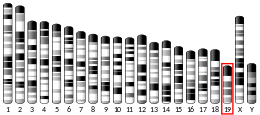PCGF5
Polycomb group RING finger protein 5 is a protein that in humans is encoded by the PCGF5 gene.[5][6]
References
Further reading
- Hartley JL, Temple GF, Brasch MA (2001). "DNA cloning using in vitro site-specific recombination.". Genome Res. 10 (11): 1788–95. PMC 310948
 . PMID 11076863. doi:10.1101/gr.143000.
. PMID 11076863. doi:10.1101/gr.143000.
- Wiemann S, Weil B, Wellenreuther R, et al. (2001). "Toward a catalog of human genes and proteins: sequencing and analysis of 500 novel complete protein coding human cDNAs.". Genome Res. 11 (3): 422–35. PMC 311072
 . PMID 11230166. doi:10.1101/gr.GR1547R.
. PMID 11230166. doi:10.1101/gr.GR1547R.
- Simpson JC, Wellenreuther R, Poustka A, et al. (2001). "Systematic subcellular localization of novel proteins identified by large-scale cDNA sequencing.". EMBO Rep. 1 (3): 287–92. PMC 1083732
 . PMID 11256614. doi:10.1093/embo-reports/kvd058.
. PMID 11256614. doi:10.1093/embo-reports/kvd058.
- Strausberg RL, Feingold EA, Grouse LH, et al. (2003). "Generation and initial analysis of more than 15,000 full-length human and mouse cDNA sequences.". Proc. Natl. Acad. Sci. U.S.A. 99 (26): 16899–903. PMC 139241
 . PMID 12477932. doi:10.1073/pnas.242603899.
. PMID 12477932. doi:10.1073/pnas.242603899.
- Ota T, Suzuki Y, Nishikawa T, et al. (2004). "Complete sequencing and characterization of 21,243 full-length human cDNAs.". Nat. Genet. 36 (1): 40–5. PMID 14702039. doi:10.1038/ng1285.
- Gerhard DS, Wagner L, Feingold EA, et al. (2004). "The status, quality, and expansion of the NIH full-length cDNA project: the Mammalian Gene Collection (MGC).". Genome Res. 14 (10B): 2121–7. PMC 528928
 . PMID 15489334. doi:10.1101/gr.2596504.
. PMID 15489334. doi:10.1101/gr.2596504.
- Wiemann S, Arlt D, Huber W, et al. (2004). "From ORFeome to biology: a functional genomics pipeline.". Genome Res. 14 (10B): 2136–44. PMC 528930
 . PMID 15489336. doi:10.1101/gr.2576704.
. PMID 15489336. doi:10.1101/gr.2576704.
- Mehrle A, Rosenfelder H, Schupp I, et al. (2006). "The LIFEdb database in 2006.". Nucleic Acids Res. 34 (Database issue): D415–8. PMC 1347501
 . PMID 16381901. doi:10.1093/nar/gkj139.
. PMID 16381901. doi:10.1093/nar/gkj139.
 . PMID 11076863. doi:10.1101/gr.143000.
. PMID 11076863. doi:10.1101/gr.143000. . PMID 11230166. doi:10.1101/gr.GR1547R.
. PMID 11230166. doi:10.1101/gr.GR1547R. . PMID 11256614. doi:10.1093/embo-reports/kvd058.
. PMID 11256614. doi:10.1093/embo-reports/kvd058. . PMID 12477932. doi:10.1073/pnas.242603899.
. PMID 12477932. doi:10.1073/pnas.242603899. . PMID 15489334. doi:10.1101/gr.2596504.
. PMID 15489334. doi:10.1101/gr.2596504. . PMID 15489336. doi:10.1101/gr.2576704.
. PMID 15489336. doi:10.1101/gr.2576704. . PMID 16381901. doi:10.1093/nar/gkj139.
. PMID 16381901. doi:10.1093/nar/gkj139.


